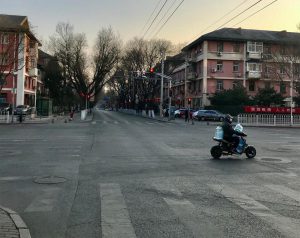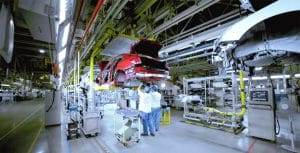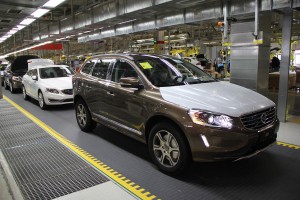
Beijing residents stayed inside over the Lunar New Year Holiday weekend. Schools, offices and factories were ordered closed in many parts of China for another week.
The streets of Beijing were unusually quiet this past weekend, a time when the Chinese would normally be out in large numbers celebrating the end of the Lunar New Year. But with the coronavirus now blamed for more deaths in that country than were experienced during the 2003 SARS epidemic, much of the population appears to be hunkering down at home.
And it’s anyone’s guess when things will get back to normal with 11 of 31 Chinese provinces mandating the normal shutdown of schools, offices and factories continue for at least another week to limit the risk that the spread of the disease will escalate.
The impact will clearly be felt by the Chinese economy, the auto industry, in particular, with estimates of lost production running anywhere from 1 million to as much as 1.7 million vehicles before things return to normal. But the longer the shutdowns continue, the more likely the impact will be felt abroad, especially in the U.S., where automakers have become increasingly dependent upon Chinese-made car parts.
(Coronavirus expected to have big impact on Chinese auto industry)
“The concern is not the zombie apocalypse with people dying in the streets. The concern is that a huge chunk of the global economy gets put out of commission as people wait it out,” wrote Patrick Chovanec, managing director at Silvercrest Asset Management in New York, in an advisory on the epidemic.
While Chinese plants ship relatively few vehicles abroad, at least when compared to Mexican, Japanese, Korean and German factories, China annually exports about $70 billion worth of car parts and accessories globally, roughly 20% going to the U.S.

GM, China’s third-largest automaker, could suffer substantially if the coronavirus keeps plants closed for longer than the next week or so.
The list covers everything from steering wheels to shock absorbers, down to literal nuts and bolts, washers, springs and copper rivets. Due to Trump administration tariffs, automakers have, in some cases, sought out alternative sources. But trade data shows the U.S. still is buying more than $2 billion in Chinese-made wheels and nearly $700 million in suspension parts.
In an industry that has moved to tighten the supply chain in order to hold down costs and better manage quality, there often are few, if any alternatives should parts supplies get cut off. Two years ago, Ford had to temporarily idle production of the highly popular – and profitable – F-150 pickup when a fire knocked out a key Michigan supplier’s plant.
There has been “no impact yet,” from the shutdowns ordered in China to control the coronavirus epidemic, said Kelli Felker, who oversees manufacturing public relations for Ford. “But we’re closely monitoring the situation.”
Ironically, what may help automakers in the U.S. and other foreign markets is the fact that Chinese auto sales experienced an unusual slump in 2019 after two decades of back-to-back-to-back double-digit growth.

Volvo builds XC60 SUVs at its plant in Chengdu, China, and that plant could face parts shortages if the coronavirus isn’t contained quickly.
Even before the coronavirus struck, the Chinese new vehicle market was expected to remain relatively flat in 2020, said Michael Dunne, head of Asian automotive consulting firm ZoZo Go. “Very soft demand in China’s domestic market means parts makers will have inventory in (the) short term to ship to (the) U.S.,” Dunne said in an e-mail to TheDetroitBureau.com.
(FCA looks to grow presence in China with EV joint venture)
Nonetheless, industry experts caution, even the lack of a single critical part could shut down production at a U.S. plant, as the May, 2018 fire at Meridian Magnesium Products demonstrated. The plant provided a metal beam produced nowhere else. As a result, Ford had to halt production of the single best-selling model in its U.S. portfolio for several weeks.
Even if U.S. assembly plants dodge the bullet, American automakers are already beginning to feel the heat from the coronavirus crisis.
Ground Zero is the city of Wuhan, capital of Hebei Province, which serves as a major production base for foreign automakers like, Nissan, Kia, PSA and Honda, as well as a number of indigenous Chinese automakers, such as Nissan partner Dongfeng. But, as the virus has spread far beyond Wuhan, IHS Markit now reports that at least 11 provinces are following Hebei’s lead, extending the Lunar New Year shutdown for at least a week.
“All enterprises in Shanghai shall not resume work before February 9th, 2020,” but for some critical operations, including supermarkets, water supplies and epidemic control organizations, the government declared late last week.
If things return to relative normalcy after that, analyst Dunne said he believes China’s auto industry will suffer about 1 million units of lost production. But a new forecast by IHS warns that if things drag on, the industry’s production losses could rise to 1.7 million or more.
As the country’s third-largest automaker, General Motors could be hit hard financially. But even lower down on the rung of brands, Ford and Fiat Chrysler would also feel the impact.
Longer term, the bigger worry is what the epidemic might mean more broadly for China.
“The greatest threat is that the virus whacks consumer confidence — which is already shaky as a result of the slowing Chinese economy and U.S. China trade tensions,” said Dunne. “Weak demand for new cars means idle factories which could lead to job losses.”
(New vehicle sales in China fall 8.2 percent in 2019)
The question is whether an extended crisis could lead to idle factories and job losses in the U.S., as well.

